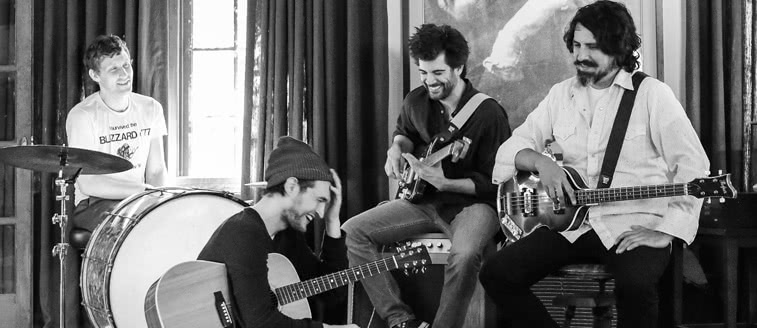Dot Hacker are an intriguing outfit. With members plucked from a variety of different acts – bands like Red Hot Chili Peppers, Hella and neo-soul stalwart Gnarls Barkley – Dot Hacker are a kind of musical Avengers, coming together whenever schedules align to write music. Frontman Josh Klinghoffer, who’s also the guitarist in the Chili Peppers, finds himself in a rather unique position to reflect on the shift between emerging band and stadium superstars. Plus, he seems like an actual nice guy, to boot.
The most obvious downside to a band like Dot Hacker is simply finding the time for each member to be in the same room together. There is no luxury here to take several months to slowly ease a record into shape; instead, speed is key.
“Everything that Dot Hacker does depends on availability or temporal things, on physical spaces,” Klinghoffer explains. “Sadly, this band is often challenged simply by my not being around. With this album, because of my being on tour, a lot of the songs were brought in not fully formed and then rearranged.
“For years and years I’d beat myself up about it, having tonnes and tonnes of songs that I never finish, that are left either as gibberish or thematically open-ended. I’ll wait until the right moment to actually make them a song. I feel if I finish a song but don’t have a band to play it with, by the time the moment comes it might not be what I want to say anymore, or where I am. I used to tell myself I was being lazy. While that might still be true, I think that when it comes to a song like ‘Whatever You Want’, well, I wrote some of the chords for that six years ago. I wrote some of the lyrics in Ethiopia when I went there with Flea at the beginning of writing the last Chili Peppers album, and only finished them once Dot Hacker decided to make it one of the songs for this album. So it can be an involved process.”
The band is rounded out by Clint Walsh and Eric Gardner – both former touring members with Klinghoffer for Gnarls Barkley – and Hella bassist Jonathan Hischke. The new record, How’s Your Process? (Work), is Dot Hacker’s second album, and although they have certainly established themselves as more than some motley side band or pet project, the concern that people are only giving them notice thanks to their association with larger acts is still present. Not that Klinghoffer loses much sleep over the idea.
“You can easily say that people would come to the music because of these other acts, that they might look at our music through the scope of another act. At the same time, all the people in Dot Hacker are a little older now. I used to bemoan the fact that this band couldn’t just jump in the van and tour all over America, travel all year long like other bands that I love. But really, in this day and age, would this band survive that sort of thing? We’re all in other projects, so does that allow this band to not break its back, kill itself trying to get together and actually make the music that it wants to make? Everything that seems like a curse in this situation, if you examine a little closer shows a lot of positive. We can really bend any situation to our advantage, and it’s because we all just really like playing together. We’re all influenced by so many different things, we’ve done so many different projects, but nothing we could really call our own. And I think the personal relationships, the friendship, is at the core of what we wanted to start, and what I had never found with people prior to this.”
A large challenge Klinghoffer faces – beyond simply finding time to sit down and jam with the band – is the mental gymnastics involved in switching in and out of the Chili Peppers.
“There’s definitely a change in mentality, especially in what my role is from one band to the other. I think being someone who would often play in different situations – you know, I’ll be off on this tour to play with this person, then I’m suddenly off in a studio somewhere – I’m kind of used to changing roles. I’ve got to the point where both bands I’m in are very personal to me, and I can analyse what role I play in both and choose how I let that affect me.
“There are days where I’ll feel like I prefer being the shot-calling leader with Dot Hacker, and then there are days when I’m happy to be the instrumentalist who doesn’t have the emotional, frontman weight that Anthony [Kiedis] has on his shoulders. I think it also allows me to understand where Anthony comes from a lot of the time, when he’s in the writing process and I’m doing the same thing with another band at the same time. It is hard sometimes, and it seems intense and crazy, but I’m able to do it, and they’re all facets of my being and my personality.”
How’s Your Process (Work) out now through Smack Face Records.


































